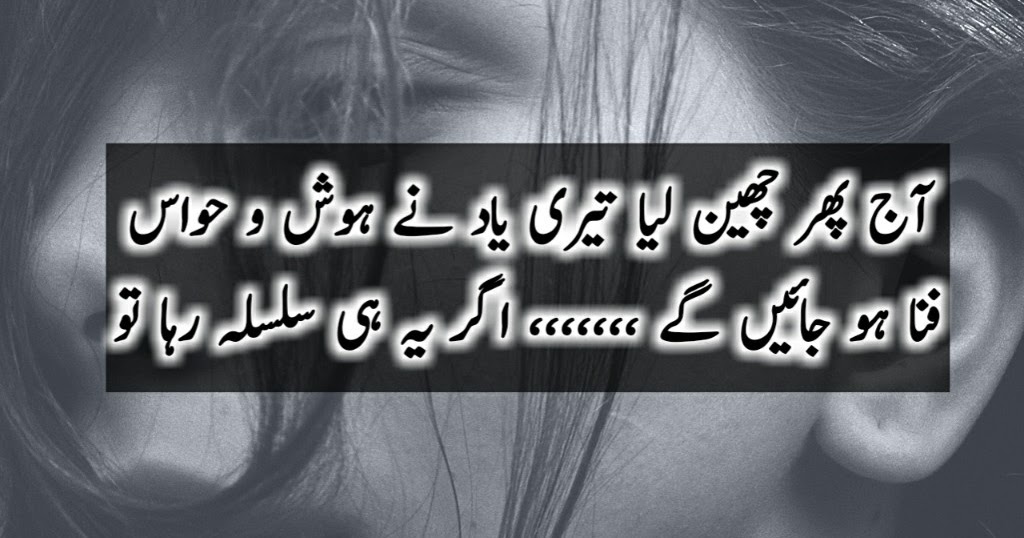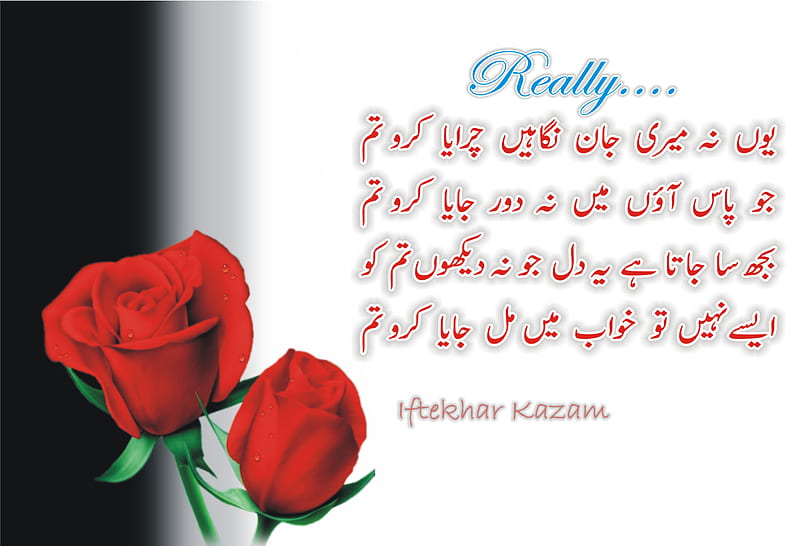Introduction

Sad poetry in Urdu is a powerful form of expression that captures the deep emotions of sorrow, loss, and heartbreak. Through beautifully crafted verses and poignant words, this poetry resonates with readers who have experienced pain and emotional turmoil.

For centuries, Urdu poets have used this genre to express feelings that are often difficult to articulate, making it a source of comfort and understanding for those going through emotional struggles.

In this article, we explore the world of sad poetry in Urdu, its cultural significance, and how it continues to touch the hearts of readers today.
What is Sad Poetry in Urdu?

Sad poetry in Urdu is a genre of poetry that delves into themes of melancholy, sorrow, and loss. It often reflects the emotional depth of the poet and the pain they experience, whether through personal grief or societal hardships.

Urdu poets have long been known for their eloquent expressions of sadness, using metaphors, similes, and rhythm to convey the intensity of their emotions.

Sad poetry in Urdu captures the essence of human vulnerability, exploring the complex nature of love, loss, and separation. This form of poetry speaks directly to the heart, offering solace and understanding to readers who relate to the emotions expressed.
Why is Sad Poetry in Urdu So Popular?

Sad poetry in Urdu has a unique cultural significance in South Asia. It has become a cherished part of the literary tradition in Pakistan and India, especially among speakers of the Urdu language.

The richness and beauty of the language allow poets to express emotions in a way that feels deeply personal yet universal.

One reason for the popularity of sad poetry in Urdu is its ability to connect with the readers on a deeply emotional level. The language’s poetic quality, combined with the themes of love and loss, makes it relatable to many.

People who are experiencing heartache, loneliness, or grief often turn to this form of poetry to find comfort and empathy.
The Influence of Classic Urdu Poets

Urdu literature is filled with some of the most renowned poets whose sad poetry has left an indelible mark on the literary world. These poets’ works continue to inspire and move readers even today. Some of the most celebrated poets include:
Allama Iqbal

Allama Iqbal, one of the most prominent figures in Urdu literature, explored themes of love, loss, and separation in many of his works. While his poetry also focuses on spiritual awakening and national unity, his melancholic verses often convey deep emotional truths that resonate with readers.

His famous poem “Shikwa” reflects the pain and sorrow of humanity and its relationship with the divine.
Faiz Ahmed Faiz

Faiz Ahmed Faiz is another iconic poet whose sad poetry in Urdu has captured the hearts of millions. His work blends political activism with personal sadness, expressing the anguish of both societal and personal loss. Poems like “Mujh Se Pehli Si Mohabbat” convey the sorrow of love lost and the yearning for a past that can never be recaptured.
Mirza Ghali

Mirza Ghalib, perhaps the most famous poet in the Urdu language, is known for his profound and sorrowful verses. His poetry speaks of love, heartbreak, and existential anguish, often conveying the complexities of human emotion. His ghazals are rich with sadness, and his words continue to resonate with readers, especially in their portrayal of love and loss.
Sad Poetry in Urdu and Its Emotional Impact

Sad poetry in Urdu carries immense emotional weight, and its impact on readers can be profound. The beauty of this poetry lies not only in its ability to evoke sadness but also in its capacity to heal and provide catharsis. Many people find solace in the words of these poets, as their verses provide a way to express emotions that may otherwise remain hidden.
Catharsis Through Poetry

Reading sad poetry in Urdu offers a kind of emotional release, often allowing readers to process their grief and sadness. When words fail, poetry can capture complex emotions, offering a sense of relief and understanding. This catharsis helps readers feel less alone in their struggles and more connected to their own emotions.
Empathy and Connection

The universal themes explored in sad poetry in Urdu such as love, loss, and despair create a sense of shared experience. For many, reading these poems creates a feeling of empathy and connection with others who have experienced similar emotions. It reassures readers that they are not alone in their feelings of pain.
The Language of Sad Poetry in Urdu

The Urdu language is known for its lyrical quality and depth, which makes it ideal for poetry. The richness of the language allows poets to weave complex emotions into words, giving readers an experience that feels both deeply personal and universally relatable.
The way Urdu poetry captures the nuances of sadness is unmatched, making it an ideal medium for expressing raw and vulnerable emotions.
The Importance of Ghazals in Sad Poetry

One of the most famous forms of Urdu poetry is the ghazal. Ghazals are characterized by their melancholic themes, often focusing on unrequited love or heartbreak. They are typically composed of rhyming couplets and often express the pain of separation or loss. Ghazals are a staple in the world of sad poetry in Urdu, offering a timeless way to express deep emotional truths.
How Sad Poetry in Urdu Helps in Healing

Sad poetry in Urdu serves as a form of emotional therapy. For many, reading or writing sad poetry allows them to confront their deepest feelings, helping them process and understand their emotions. Through poetry, individuals can express their sorrow in a safe and creative way, which can be deeply healing.
Expressing Grief and Loss

When dealing with the loss of a loved one, a breakup, or other painful experiences, people often struggle to find the right words to describe their grief. Sad poetry in Urdu offers an outlet for this pain. By reading poems about loss, individuals can better understand and articulate their own grief, which can be the first step toward healing.
A Source of Comfort and Solace

Sad poetry in Urdu provides comfort to those who feel isolated in their sorrow. The knowledge that others have experienced similar pain and have been able to express it in such beautiful ways offers a sense of companionship.

In times of despair, poetry becomes a source of solace, reminding people that even in their darkest moments, they are not alone.
Popular Themes in Sad Poetry in Urdu

Sad poetry in Urdu covers a wide range of emotional experiences. While love and loss are the most common themes, poets also explore feelings of regret, unrequited love, separation, and loneliness. Each theme offers its own unique emotional depth and resonates with different aspects of the human experience.
Love and Heartbreak

Many of the most popular sad poems in Urdu center around love and heartbreak. These poems explore the pain of unreturned love, separation from a partner, or the end of a meaningful relationship. Poems like Faiz Ahmed Faiz’s “Mujh Se Pehli Si Mohabbat” express the sorrow of love lost and the yearning for the past.
Grief and Loss

Another major theme in sad poetry in Urdu is the grief that comes with losing someone dear. This can be the loss of a loved one through death, the end of a friendship, or the fading of a once-close bond. Sad poems about grief provide a way to process the emotions associated with death and loss, allowing individuals to find healing through words.
Loneliness and Isolation

Sad poetry in Urdu also addresses feelings of loneliness and isolation. These poems convey the pain of feeling disconnected from others, whether due to personal circumstances or the loss of a close relationship. The rawness of these poems offers a voice to those who feel alone, helping them articulate their inner struggles.
Writing Sad Poetry in Urdu

Writing sad poetry in Urdu can be a cathartic and healing process. If you are experiencing sadness or grief, putting your emotions into words can provide a sense of relief. Here are a few tips for writing your own sad poetry in Urdu:
Be Honest and Vulnerable

To create truly impactful sad poetry, it’s essential to be honest and vulnerable in your writing. Express your emotions freely and don’t hold back. Let the pain, sadness, or longing pour onto the page.
Use Simple Yet Powerful Language

Urdu poetry often uses simple yet evocative language. Don’t worry about using overly complex words—focus on expressing your emotions as clearly as possible. Simple words, when used creatively, can carry immense emotional weight.
Experiment with Structure

Experiment with different poetic structures, such as ghazals or free verse, to see which one suits your emotions best. Ghazals are particularly effective for expressing sadness and longing, but free verse allows for more flexibility in conveying complex emotions.
Use Metaphors and Imagery

Urdu poetry is known for its beautiful metaphors and imagery. Use these techniques to create vivid pictures that reflect your emotions. Describing sadness through imagery, like a “storm of tears” or “a heart heavy as stone,” can make your poem more impactful.
Conclusion

Sad poetry in Urdu is a beautiful and emotional form of expression that allows readers to connect with their deepest feelings of sorrow and longing.
Whether it’s through the works of iconic poets like Faiz Ahmed Faiz, Allama Iqbal, or Mirza Ghalib, or through the personal poetry of everyday people, Urdu poetry continues to provide solace and catharsis for those in pain.

Through its rich language, poignant themes, and emotional depth, sad poetry in Urdu remains an important part of the literary tradition. It offers a voice to those experiencing grief, heartbreak, and loneliness, and serves as a reminder that even in our darkest moments, we are not alone.



